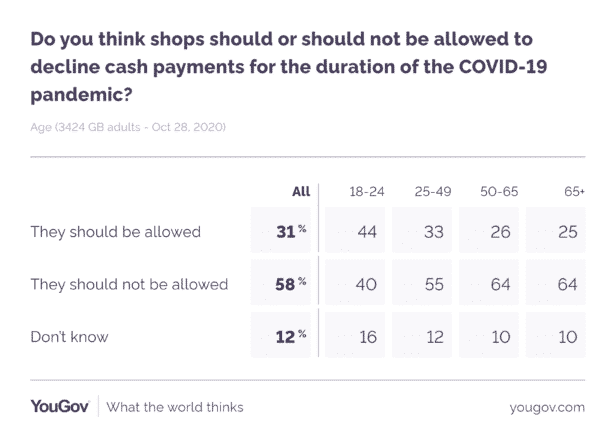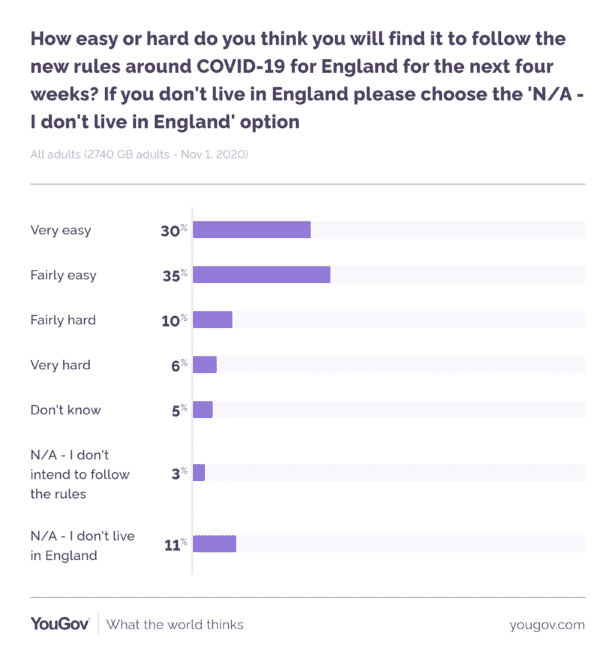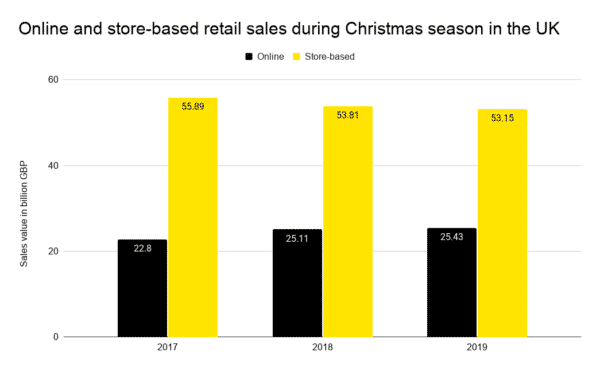As England enters the second week of the autumn Covid-19 lockdown, our thoughts have turned to the potential impact on the busy retail period leading up to Christmas.
Before the start of the latest lockdown measures last week, some shoppers were seen rushing to retail outlets before the shutters came down, and it remains to be seen what in-store shopping will be able to take place in December.
Right now, it’s unclear whether the current restrictions will end as suggested on December 2nd, or they will be extended. Regardless, it is likely that Christmas shopping in 2020 will be significantly different from previous years.
We’ve taken a look at historic trends and recent studies to get a greater insight into what might happen this year, and key dates in the Christmas shopping calendar. Read on to find out more…
Christmas sales before ‘unprecedented times’
Every year since 2016, Christmas sales in the UK have been valued at around £78 billion (via Statista), so there is serious money to be made by retailers who provide the right products and experience in the lead up to the festive period.
The big difference this year will be where the money is spent: online or in store. In previous years we’ve had the freedom of choice; this year will be more prescriptive. For example:
- If lockdown is extended, people will only be able to visit physical stores classed as “essential” such as supermarkets (and discount retailers like B&M and Home Bargains). In terms of Christmas gifts, that’s a lot of Tesco Ho-ho-homewares and Aldi Specialbuys.
- If lockdown ends on December 2nd, there will be a combination of nervousness from some people to visit stores in-person, but also a great demand from those who struggle to shop online.
We could also expect to see:
- Black Friday (November 27th) will largely be online this year, and will be a key event for many Christmas shoppers.
- Shipping delays may occur in December as the postal system and courier network become overwhelmed with seasonal demand.
- Product shortages may be seen in non-essential items (e.g. savoury snacks, festive cheeses, longer-life baked goods) as households stock up early before shorter trading hours over the Christmas period.
It’s a generational thing
Above, we mentioned that shops could see a greater demand after lockdown ends, and this becomes clear why when you start reflecting on relevant data sets. At the end of October, YouGov asked 3,424 adults about their thoughts on cash payments.
44% of people aged 18-24 believe that shops should be allowed to decline cash payments for the duration of the pandemic, versus just 25% of those over the age of 65. And those over age 50 are pretty adamant that shops should not be able to decline cash payments, with 64% of respondents in this age bracket stating this.
With such strong opinions on the use of cash instead of card or other contactless technologies, it would be fair to suggest that in-store experiences are still important to certain generations.
At the moment, there is still some hope that some in-person shopping will be able to take place in England after the Covid-19 restrictions are lifted in December.
Below we have included another YouGov survey result which we believe could have a very different response if it was conducted in December with an extended lockdown. At the moment, 65% of all adults think it will be easy to follow Covid-19 rules in November.
eCommerce in A/W 2020
Whilst cash and offline retail clearly still has its place in 2020, eCommerce is offering a safer way for Christmas shopping to take place this year. It will be interesting to see how the chart below changes after the coming festive period.
In 2019, around one-third of UK Christmas retail sales were done online, with the remaining two-thirds being done in store. But online sales have been growing each year, a trend that is highly likely to continue this year.
The main reason that consumers shopped online for Christmas in the United Kingdom in 2019 was due to low cost delivery (79%), followed by free delivery (78%). If the same survey was to run this year, it would likely have some very “2020” responses, for example:
- Shielding due to medical condition or age
- Uncomfortable visiting physical stores with the threat of Coronavirus
- Not wanting to wear a mask to do shopping
- Not wanting to queue outside shops when the weather is more unpredictable
- Stores were temporarily closed due to lockdown when I did the bulk of my Christmas shopping
This year has been full of firsts, but there is something that hasn’t changed despite Covid-19. That ‘thing’ is for eCommerce brands to have an excellent online user experience. To ensure that both consumers and search engines are able to find relevant categories and products, and to make sure that orders are able to be fulfilled efficiently.
Undeniably, the challenge is greater this year, but remember that Christmas sales in the UK are expected to be around £78 billion. Making the effort now as a marketer could be the difference between your brand getting a healthy slice, or losing part of it to your competitors. Bah humbug!




